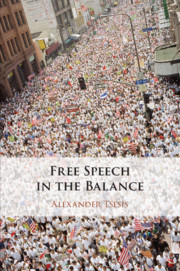Book contents
- Free Speech in the Balance
- Free Speech in the Balance
- Copyright page
- Dedication
- Contents
- Preface
- Acknowledgments
- Part I Theory
- Part II Application
- 5 US Formalism and EU Proportionality Alternative
- 6 Offense, Incitement, True Threats, and Hate Speech
- 7 Terrorist Incitement on the Internet
- 8 First Amendment on Campus
- 9 High Schooler Speech in the Age of the Internet
- 10 On the Campaign Trail
- Conclusion
- Notes
- Index
8 - First Amendment on Campus
from Part II - Application
Published online by Cambridge University Press: 06 November 2020
- Free Speech in the Balance
- Free Speech in the Balance
- Copyright page
- Dedication
- Contents
- Preface
- Acknowledgments
- Part I Theory
- Part II Application
- 5 US Formalism and EU Proportionality Alternative
- 6 Offense, Incitement, True Threats, and Hate Speech
- 7 Terrorist Incitement on the Internet
- 8 First Amendment on Campus
- 9 High Schooler Speech in the Age of the Internet
- 10 On the Campaign Trail
- Conclusion
- Notes
- Index
Summary
Universities are centers of culture, self-expression, and civil activism. As the Court explained in Tinker v. Des Moines Independent Community School District, “The Court has recognized that the campus of a public university, at least for its students, possesses many of the characteristics of a public forum At the same time, however, our cases have recognized that First Amendment rights must be analyzed ‘in light of the special characteristics of the school environment.’”502 They are places to clear away cobwebs of falsehood and to identify kernels of truth. The educational value of speech is determined by its context and content.503 While campuses are hives of intellectual activity, educational needs require structure and incidental time, place, and manner restrictions in order to impart and advance knowledge without unnecessary disruptions. Educational goals must be consistent with the dissemination of accurate knowledge. Institutions of higher education retain standards for advancing truth about various disciplines, but they also provide opportunities for dissent and disagreement.504 Accordingly, controversies are inevitable, given the many views represented by members of the faculty and student bodies. The rights of speakers should therefore be balanced with administrative requirements for maintaining pedagogical and scholarly standards, while warding off harassment.
- Type
- Chapter
- Information
- Free Speech in the Balance , pp. 117 - 137Publisher: Cambridge University PressPrint publication year: 2020

